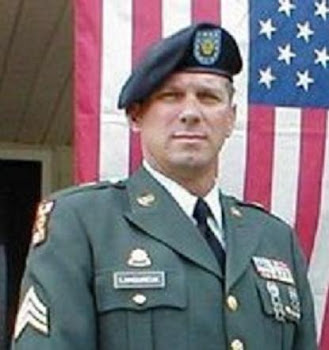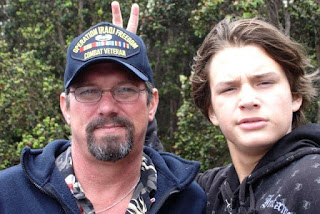By Dahlia Lithwick
NEWSWEEK
Published Feb 11, 2010
From the magazine issue dated Feb 22, 2010
"Perhaps the inevitable conclusion here is the one nobody wants to say out loud: we have known for years that treatment works better than incarceration when it comes to criminal defendants with drug and mental-health problems."
The problem is hardly a new one, but we need only watch The Hurt Locker to refresh our collective memory: veterans return from war, having seen and survived unspeakable things, then try to adjust to civilian life with inadequate resources and support. Depending on the study you read, between 20 and 50 percent of veterans from the Iraq and Afghanistan wars suffer from posttraumatic stress and other mental disorders—and half don't seek mental-health care. Those who do don't always receive the kind of care they need. The results of these systemic failures are increased instances of rape, assault, addiction, and other criminal acts that tangle up veterans in the criminal courts. The Department of Veterans Affairs estimates that veterans account for 10 percent of the people with criminal records.
The first "veterans' court" was launched in Buffalo, N.Y., in January 2008 by Judge Robert Russell. His program was based on the various "problem solving" tribunals around the country, ranging from specialized drug courts to mental-health and domestic-violence courts. Drug courts, for instance, integrate treatment with justice-system case management, and closely supervise and monitor participants. Studies show they have decreased recidivism rates as well as the cost of incarceration. In recent testimony before the House Veterans' Affairs Committee, Russell said his program teams veterans guilty of nonviolent felony or misdemeanor offenses with volunteer veteran mentors, requiring them to adhere to a strict schedule of rehabilitation programs and court appearances. One hundred and twenty veterans are enrolled in the Buffalo program; 90 percent of participants have successfully completed the program, and the recidivism rate is zero.
Since the Buffalo experiment was launched, 22 other cities and counties have created their own veterans' courts. The Senate is looking at legislation introduced by John Kerry and Lisa Murkowski to fund more veterans' courts for nonviolent offenders. Whether these will serve violent offenders as well is already a difficult issue for legislators and judges. The Buffalo court handles chiefly nonviolent offenses. But that may not solve the problems in Colorado Springs, Colo., where there have been 15 former GIs arrested in connection with a dozen murders over the past five years. These are guys who have never been involved in the criminal-justice system in their lives. They come home from war profoundly different men.
That's why Robert Alvarez, a psychotherapist with the Wounded Warrior program at Fort Carson, recently told a Denver newspaper that it's a mistake to carve the most violent offenders out of the proposed veterans' court in Colorado: "The violent offenders need help more than anybody … the very skills these people are taught to follow in combat are the skills that are a risk at home." If you are going to create special judicial programs to help veterans, does it make sense to give special services only to those who need help the least?
The bigger issue with the veterans' courts has been raised by the American Civil Liberties Union, which objects to the creation of a unique legal class of criminals based on their status as veterans. Thus, Lee Rowland of the ACLU of Nevada opposes the proposed state veterans'-court bill because it provides "an automatic free pass based on military status to certain criminal-defense rights that others don't have." Mark Silverstein, legal director of the Colorado ACLU, explains that the legal category of "veteran" is both too broad and too narrow, sweeping in both Vietnam and World War II veterans who have very different experiences, but excluding nonveterans who also suffer from PTSD and aren't eligible for any special courts.
Perhaps the inevitable conclusion here is the one nobody wants to say out loud: we have known for years that treatment works better than incarceration when it comes to criminal defendants with drug and mental-health problems. We also know that close supervision and monitoring work better than casting our most vulnerable citizens adrift. Veterans deserve special treatment for their service, and the fact that veterans' courts seem to work as well as they do suggests that politicians needn't justify their existence beyond that fact. But whether we really want to create first- and -second-class criminal-justice services, and whether we can truly draw any principled line between nonviolent veterans and violent ones in the judicial treatment they receive, are not easy political questions, but thorny legal ones.
(article from http://www.newsweek.com/id/233415.)
Sue Lamoureux's blog for her husband, J Patrick Lamoureux. Sue died on 24 August 2015.
PAT LAMOUREUX

PAT LAMOUREUX - One episode in a person's life, does not define the person.
Saturday, February 20, 2010
Thursday, February 18, 2010
THANK YOU - VA Southern Nevada Healthcare System
Finally, after months of battling Nye County Nevada and being aware of the failure of Pahrump, Nye County, Nevada to treat Pat Lamoureux in an appropriate and timely manner - the VA of Southern Nevada stepped up to the plate, and removed the bullet from Pat's leg on Wednesday, February 17th, 2010.
That would be the same bullet that had been in his leg since September 19, 2008; the same bullet that had been causing the gunshot wound to ooze since August of 2009.
This was NOT the responsibility of the VA; Nye County should have made certain that appropriate and timely medical care was rendered to Pat, but that did not happen. It is my understanding that this is not the first time that Nye County (i.e., the Sheriff and certain employees) have failed with regards to responsibilites to act in an appropriate manner concerning the care and supervision of those pre-trial detainees at the Nye County Detention Center.
The VA has certainly stepped up to the plate in providing care for Pat again; for that I am extremely thankful.
I am hopeful that the next step of the VA will be to begin to provide psychological care for Pat - in an APPROPRIATE manner. He has been without any counseling for the duration of this horrific tragedy. I can only wonder what impact this will have on him. He has deserved SO much BETTER treatment than he has received.
I do not count on Nye County acting in any reasonable manner. At least the bullet has been removed from Pat's leg; Nye County did not "win" in what appeared to be the apparent "hope" that perhaps Pat would lose his leg - and even perhaps, his life.
Thank you VA for taking care of Pat Lamoureux - when Nye County Nevada failed to do so. Pat Lamoureux is an honorable man and a Veteran. He deserves better treatment than what he has had to endure.
Perhaps in June 2010, Nye County will take steps to find a Sheriff that can perform the duties of the position he was elected to, while ensuring that the employees under his direct supervision, do the same.
That would be the same bullet that had been in his leg since September 19, 2008; the same bullet that had been causing the gunshot wound to ooze since August of 2009.
This was NOT the responsibility of the VA; Nye County should have made certain that appropriate and timely medical care was rendered to Pat, but that did not happen. It is my understanding that this is not the first time that Nye County (i.e., the Sheriff and certain employees) have failed with regards to responsibilites to act in an appropriate manner concerning the care and supervision of those pre-trial detainees at the Nye County Detention Center.
The VA has certainly stepped up to the plate in providing care for Pat again; for that I am extremely thankful.
I am hopeful that the next step of the VA will be to begin to provide psychological care for Pat - in an APPROPRIATE manner. He has been without any counseling for the duration of this horrific tragedy. I can only wonder what impact this will have on him. He has deserved SO much BETTER treatment than he has received.
I do not count on Nye County acting in any reasonable manner. At least the bullet has been removed from Pat's leg; Nye County did not "win" in what appeared to be the apparent "hope" that perhaps Pat would lose his leg - and even perhaps, his life.
Thank you VA for taking care of Pat Lamoureux - when Nye County Nevada failed to do so. Pat Lamoureux is an honorable man and a Veteran. He deserves better treatment than what he has had to endure.
Perhaps in June 2010, Nye County will take steps to find a Sheriff that can perform the duties of the position he was elected to, while ensuring that the employees under his direct supervision, do the same.
Subscribe to:
Comments (Atom)
"Grandpa Pat & Kain"

"Kain-man" the jokester....
Pat Lamoureux - Iraq 2003

"Pat is an extraordinary, thoughtful, kind and generous man...not to mention a wonderful friend, in which one could always count upon to be there when in need." (words of a long time friend)
Pat's Family

Mica & Heather, grandson Kain